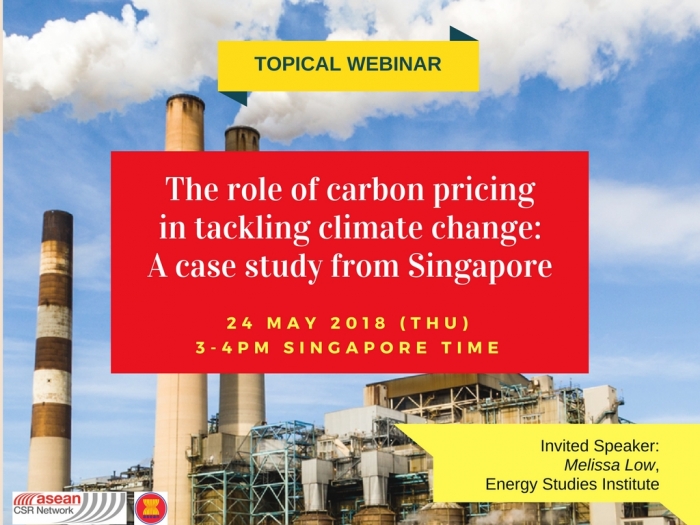Only three (3) days to go!
Sign up for ACN's first topical webinar:

THE ROLE OF CARBON PRICING IN TACKLING CLIMATE CHANGE:
A CASE STUDY FROM SINGAPORE
24 May, 3-4PM (SG time)

Carbon pricing is an increasingly popular instrument used by governments and companies to tackle climate change. Regions and countries that have implemented carbon pricing mechanisms include the EU and China. In 2017, Singapore announced that it would also be implementing a carbon tax system from 2019 - the first in the Southeast Asia region. While many have cheered this move, industries have voiced concerns about how it might affect the competitiveness of firms here. This webinar will explain the mechanisms of carbon pricing and how it is being used to tackle climate change, as well as go further in-depth by using Singapore as a case study for discussion. It will also discuss the move in light of international market mechanisms currently being developed under the Paris Agreement, which is expected to play a significant role in facilitating countries in meeting their climate goals in the coming years.
This webinar will be conducted by Ms Melissa Low, Research Fellow, Energy Studies Institute.
******
Melissa Low joined the Energy Studies Institute in September 2010. She holds a Master of Laws (LLM) in Climate Change Law and Policy (with distinction) from the University of Strathclyde and a Master of Science in Environmental Management from the National University of Singapore. For her NUS Master thesis on past and contemporary proposals on equity and differentiation in shaping the 2015 climate agreement, Melissa was awarded the Shell Best Dissertation Award 2013. She received her Bachelor of Social Sciences in Geography degree (with Honors) and a minor in Urban Studies from the National University of Singapore in 2010.
Melissa has participated in the United Nations Framework Convention on Climate Change (UNFCCC) Conference of Parties (COP) talks since December 2009 and is the Designated Contact Point for NUS’s accreditation to the UNFCCC. Her current research areas are on the implications of the Paris Agreement and countries’ progress in meeting their climate pledges.
|